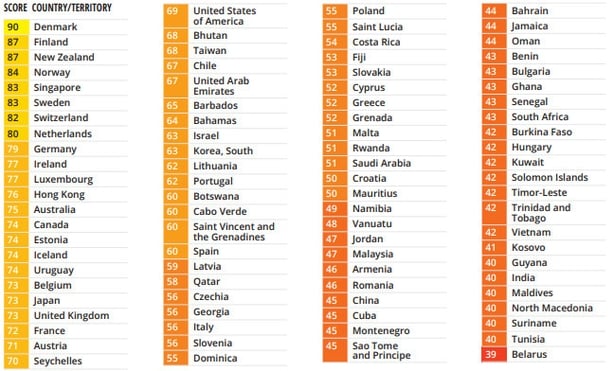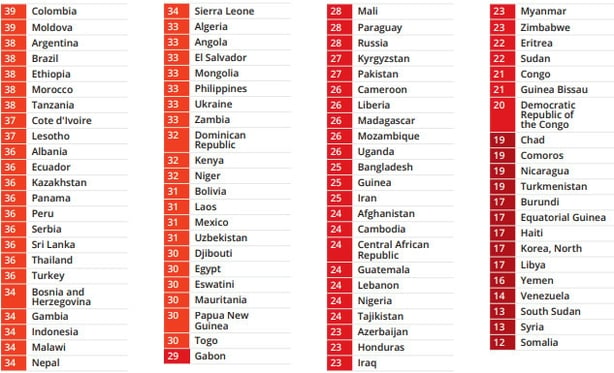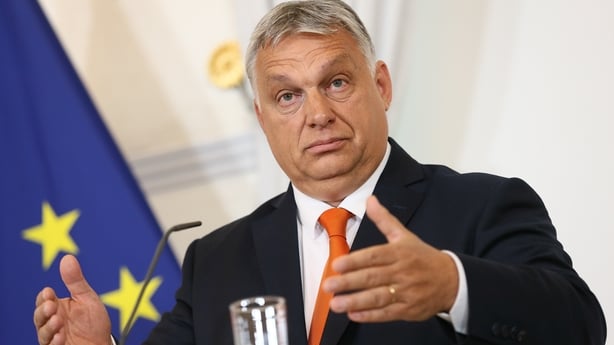Ireland has been ranked as the joint 10th 'cleanest' country on a global index measuring perceptions of public-sector corruption.
Transparency International's (TI) annual Corruption Perceptions Index ranks countries on a scale of zero (highly corrupt) to 100 (very clean).
The index ranks 180 countries and territories by their perceived levels of public-sector corruption according to experts and businesspeople.
It relies on 13 independent data sources and the higher a country’s score, the less it is perceived to be affected by public-sector corruption.
"Countries with strong institutions and well-functioning democracies often find themselves at the top of the Index," the report said.
Tied with Luxembourg with a score of 77, Ireland placed behind Denmark, Finland, New Zealand, Norway, Singapore, Sweden, Switzerland and the Netherlands.
Denmark is perceived to be the least corrupt country this year with a score of 90 out of 100.
Somalia (12), Syria (13) and South Sudan (13) remain at the bottom of the index.
Ireland's score has improved slightly from 74 points last year, and is now placed above Britain for the first time in 25 years.
TI Ireland urged Government and opposition politicians to "make a renewed commitment to ethics and anti-corruption reforms", adding that there was "no room for complacency".
It said Ireland's score was based on eight sources and TI itself was not involved in conducting the surveys.
"Ireland has experienced relatively few corruption-related scandals over the past five years. This contrasts with the period from 1997 to 2012 when the proceedings and findings of the Mahon and Moriarty Tribunals frequently made national and international headlines," Chief Executive of TI Ireland John Devitt said.
"Since then, the Oireachtas has passed new laws on whistleblowing, lobbying regulation and anti-corruption. However, international perceptions of Ireland did not shift significantly until this year and it would appear that the absence of any major controversy has influenced perceptions as much as any reform," Mr Devitt added.
Ireland's score has improved slowly since 2012, when it suffered a sharp fall on the index, receiving 69 points and leaving it in 25th place out of 176 countries.
However, TI Ireland said it continues to lag behind Northern European counterparts and called for restoration of the Public Sector Standards Bill 2015.


Hungary bottom in Europe
Transparency International described Hungary as "the most corrupt member state of the European Union."
In a statement to state news agency MTI, nationalist Prime Minister Viktor Orban's government slammed Transparency International for leaving the European Parliament out of its corruption survey.
The release of the report coincided with the Organisation for Economic Cooperation and Development saying Hungary has failed to adopt key parts of the Ostandards-setting body's anti-bribery framework, adding it could send a high-level mission to Budapest unless its concerns are allayed soon.
Separately, the European Union executive last September recommended suspending some 7.5 billion euros in funding for Hungary over its failure to curb corruption, the first such case in the 27-nation bloc under a new sanction meant to better protect the rule of law.
While Hungary has made some progress towards releasing the funds that would help its economy weather an economic downturn amid surging inflation, some milestones have yet to be reached to get the funds flowing from April at the earliest.
Mr Orban, in power since 2010, has said Hungary was no more corrupt than others in Europe, with government officials pointing to a European Parliament-Qatar corruption scandal as an example.

A government spokesman did not immediately respond to emailed questions for comment.
"Hungary continues to fail to implement key aspects of the OECD Anti-Bribery Convention and to enforce its foreign bribery laws," said the working group of countries party to the OECD's convention and tasked with monitoring adherence to it.
The working group said Hungary should report back by June that it has made 'significant progress' on recommendations.
"The proposed high-level mission results from Hungary's failure to make tangible progress in addressing long-standing recommendations including several that date back to its Phase 3 evaluation (March 2012)," it said.
It said the recommendations related to Hungary's lack of understanding of foreign bribery risk exposure, absence of strategy for detecting and investigating foreign bribery cases and inadequate time to apply investigative measures to suspects in complex cases, among other concerns.
In December, two sources with direct knowledge of the matter told Reuters that Francesco Giorgi, one of the main suspects in the investigation along with his partner, ousted European Parliament vice-president Eva Kaili, confessed to taking bribes from Qatar to influence European Parliament decisions on Qatar.
Hungary had irregularities in nearly 4% of EU fund spending in 2015-2019, according to the bloc's anti-fraud body OLAF, by far the worst result among the 27 EU countries.
Corruption rife across Latin America, according to report
Guatemala, Nicaragua and Cuba reached all-time lows on the index due to increased organised crime by public institutions, co-optation by political and economic elites and increased human rights abuses.
"Weak governments fail to stop criminal networks, social conflict, and violence, and some exacerbate threats to human rights by concentrating power in the name of tackling insecurity," said Delia Ferreira Rubio, head of Transparency International, a Berlin-based anti-corruption group.
The average index rating for the Americas stands at 43.
In Latin America, Nicaragua and Venezuela are the lowest ranked as each struggles with public institutions infiltrated by criminal networks, the report notes.
The governments of Guatemala, Venezuela, Brazil, Cuba and Peru did not immediately reply to requests for comment on the report.
Guatemala has seen state institutions co-opted by political and economic elites and organized crime, the report said.
Over the past year, Guatemalan President Alejandro Giammattei has faced a growing chorus of critics claiming he has slammed the brakes on anti-corruption efforts, as well as forced some judges and prosecutors to flee the country, the main reasons for the country's decline in the index.
Repression of the political opposition, human rights abuses and cracking down on freedom of speech is what lowered Nicaragua's ranking, while Cuba has a historic low due to the "ongoing repression" and the "absolute lack of any kind of freedom in the country," one of Transparency International's researchers told Reuters.
The report adds that the combination of corruption, authoritarianism and an economic downturn proved "especially volatile" in Brazil where ex-President Jair Bolsonaro's term was marked by dismantling anti-corruption efforts, the use of corrupt schemes to favor allies and amass support in Congress, as well as promoting disinformation.
Neighbouring Uruguay scored best in the region with a ranking of 74, the same as Canada.
Transparency International pointed to years of instability in Peru with its cycle of different governments including last December's ouster of then-President Pedro Castillo, himself a target of corruption investigations.
Weak law enforcement and high-level corruption have also allowed drug cartels to expand in the Caribbean, the report said.
"The only way forward is for leaders to prioritize decisive action against corruption to uproot its hold and enable governments to fulfill their first mandate: protecting the people," Ms Rubio said.

